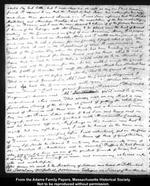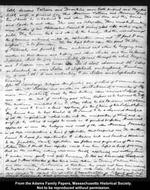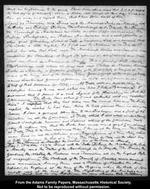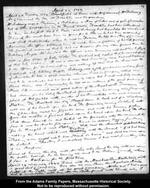April 28. 1778
April 28. Tuesday. 1778.
Breakfasted at home with Mr. Caumont [Chaumont], Mr. Dubourg, Mr. Chaumont the Son, Mr. Franklin and his grandson.
Mr. Dubourg was a Physician, a Batcheller, a Man of Letters and of good Character but of little Consequence in the French World. Franklin had been introduced to him, in his first Visit to Paris, and Dubourg had translated his Works into French. He must have been in Years for he told me he had been acquainted with Lord Bolinbroke when he was in France. He told Us a Story of Cardinal Mazarine. An officer petitioned him, to make him a Captain of his Life Guard. The Cardinal answered that he had no Occasion for any other Guard than his Tutelary Angell. Ah! Sir said the Officer your Ennemies will put him to flight with a few drops of holy Water. The Cardinal only replied that he was not afraid of that holy Water. -- It was a wonder that some thing worse had not happened to the Officer, for his insinuation was nothing less than that the Devil was the Cardinals only tutelary Angell. Dubourg was a jolly Companion and very fond of Anecdotes. He told a great number, whenever I was in Company which were said to be excellent: but his Speech was so rapid that I could not fully understand them. One I remember, he told as an instance of the great presence of Mind, Self command and good nature of the Marshall De Turenne. He had chosen for his Valet, the stoutest Grenadier in his Army who frequently plaid at Hot Cockles with another of his Domesticks who was named Stephen. The Marshall one day stooped down to look out of a Window with one of his hands upon his back. The Grenadier, coming suddenly into the Chamber, raised his Gigantic Arm and with his brawny palm gave his master a furious blow upon his hand upon his back. The Marshall drew himself in and looked at the Grenadier, who the moment he saw it was his Master fell upon his Knees in despair, begging for Mercy "for he thought it was Stephen." Well, said the Marshall, [illegible] rubbing his hand which was throbbing tingling with the Smart, "if it had been Stephen, you ought not to have struck so hard" and said no more upon the Subject. -- This Story I understood, because I had read something like it in Rousseau.
Dined at home this day with Mr. Lee, who spent the day with me upon the public business. In the Evening We went to the Italian Comedy, where I saw a Harlequin for the first time.
April 29. Wednesday. 1778.
Dined with the Marshall De Maillebois, with a great deal of Company. Here also We were
shewn the Marshalls Amie seated at the Table, with all his great Company. Mr. Lee and I had a good deal of conversation with her. Mr. Lee spoke french with tolerable ease. I
Page 2
could say but little: but I understood her as well as any one I had heard in french. I appeared to me that the Marshall had chosen her rather for her Wit and Sense than personal charms.... I was soon informed that this Marshall Maillebois and Marshall Brolie had the reputation of the two most intriguing Men in France; and I was the more disposed to believe it, of the former, because I knew of his Intrigue with Mr. Deane, to be placed over the head of General Washing
[Washington] in the Command in Chief of our American Army. It is proper in this place to insert an Anecdote. Mr. Lee and I waited on the Count de Vergens, one day to ask a
favour for our Country, I forget what it was. The Count said it was in the Department of War. It was on one of the Feasts of the Cordon blue, when the Count had been kneeling on marble Pavements in Church for some hours and his Knees aked to such a degree that he said he would take a Walk with Us to the Minister of War and ask the
favour for Us. As We walked across the Court of the Castle of Versailles We met the Marshall Maillebois. Mutual Bows were exchanged as We passed, and Mr. Lee said to the Count de Vergennes That is a great General Sir. Ah! said the Count de Vergennes, I wish he had the Command with You! Mr. Lee's Observation was in French "C'est un grand General, Monsieur!" The Count de Vergennes's Answer was Ah! Je souhaite qu'il avait le Commandment chez vous. This escape was in my Mind a confirmation strong of the design at Court of getting the whole Command of America into their own hands, and a luminous Commentary on Mr. Deans Letters which I had seen and heard read in Congress, and on his mad Contract with Monsieur Du Coudray and his hundred Officers. My feelings on this Occasion were kept to myself: but my reflection was, I will be buried in the Ocean or in any other manner sacrificed, before I will voluntarily put on the Chains of France when I am struggling to throw off those of Great Britain. If my Life should be spared to continue these memorials, more of this Marshall De Maillebois will be recorded. Puffers he had found who represented him as one of the greatest Generals of Europe, but in Holland
where I saw him in Command he proved himself as mean and mercenary as he was imbecille and
unskillfull.
After dinner We went to the
Accademy of Sciences, and heard Mr. D'Alembert as Secretary perpetual, pronounce Eulogies on several of their Members
Page 3
lately deceased. Voltaire and Franklin were both present, and there presently arose a general Cry that Monsieur Voltaire and Monsieur Franklin should be introduced to each other. This was done and they bowed and spoke to each other. This was no Satisfaction. There must be something more. Neither of our Philosophers seemed to divine what was wished or expected. They however took each other by the hand.... But this was not enough. The
Clamour continued,
untill the explanation came out "Il faut s'embrasser, a la francoise." The two Aged Actors upon this great Theatre of Philosophy and frivolity then embraced each other by hugging one another in their Arms and kissing each others cheeks, and then the tumult subsided. And the Cry immediately spread through the whole Kingdom and I suppose over all Europe Qu'il etoit charmant. Oh! il etoit enchantant, de voir Solon et Sophocle embrassans. How charming it was! Oh! it was enchanting to see Solon and Sophocles embracing!
After the Secretary's Eulogies were finished, one of which if I remember well was upon Mr. Jurieu and another on Mr. Duhamel, a number of Memoirs were publickly read by their Authors, upon various Subjects. One was upon the Art of making good Wine. As soon as he had read the Title The Audience compelled him to stop, which he did I presume with pleasure, for it was to hear a loud Applause, for the Choice of his Subject before they knew how he had treated it. It seemed to be a
chymical Analysis of all the ingredients which enter into the composition of Wine, and a
proscess by which it might be made in its greatest perfection. It was much applauded as were the Eulogies and most of the other Memoires. I remarked in all these compositions a kind of affectation that
surprized me. The Authors seemed to search for Opportunities to introduce hints and sarcastical Allusions to the frivolities, Vanity, Affectation, follies and prejudices of their own Nation. This I should have expected would have been hissed at least, if no more. But on the contrary nothing was more loudly applauded, and nothing seemed to produce more gaiety and good
humour. Is this an
honourable trait, or is it not? More Liberties of this kind were taken in France, I believe than in any other country. In America at that time they would not have been endured. In England some freedoms may be used with John Bull, but you must be very careful to respect his essential
Characteristicks of Integrity, good Sense, sound judgment, great Courage and humanity. If you touch these you
Page 4
touch an Englishman to the quick. I have somewhere read that it is a proof of the last degree of depravity: when a Nation will laugh at their own Vices and then go away and repeat them. But I have some doubt of this.
April 30. Thursday. 1778.
Dined with the Marshall Duke de Mouchy, with the Duke and Dutchess D'Ayen, The Marchioness de la Fayette, their Daughter, The Vicountess de Maillebois, her Sister, another Sister unmarried, The Prussian Ambassador, an Italian Ambassador, and a vast Collection of other great Company. I saw at Table a handsome Lady and perceived that she spoke a little English. As I satt next to Madame de la Fayette I asked her who that Lady was. The Marchioness blushed and seemed in some confusion for some time: at length she assumed an Air of vivacity and said "C'est une Amie de Monsieur de Mouchy." "It is a friend of Mr. De Mouchy." The Personage with whom We dined was Phillip de Noailles, Marshall Duke de Mouchy, a Grandee of Spain of the first Class, a Knight of the orders of the King, and of the Golden Fleece, Grand Cross of the Order of Malta, named Lieutenant General of Guienne in 1768 and Commander in Chief of that province in 1775.... At Table, with an audible Voice, he addressed himself to me and asked me how I liked Bourdeaux? I replied answered that I found it a rich elegant City, flourishing in Arts And Commerce. The Duke then asked if I was contented with my reception there? I answered that they had done me too much honour. The Duke replied, he wished he had been there to have joined them in doing me honor. I saw a general Attention to this Dialogue and a sort of Admiration in all the Company at Table, which I did [not] well understand. Count Sarsfield however and several others of the Company took care to inform me, that the Duke had made me a great Compliment at Table. This, to be sure was more than I knew at the time.... This Nobleman lived in all the Splendor and Magnificence of a Vice Roy, which is little inferiour to that of a King. The Prince de Poix was the eldest Son and the Viscount de Noailles the second Son of the Duke de Mouchy.
May 1. Fryday. 1778.
Dined with the Duke D'Ayen, the Brother of the Duke [de] Mouchy and the Father of the Marchioness de la Fayette. The House, the Gardens, the Walks, the Pictures and Furniture all in the highest Style of magnificence. The Portraits of the Family of Noailles, were ancient and numerous. Among them was a Picture of Noailles the Ambassador, in England at the time of the Regency when the Duke of Sommersett was at the head of it. The Negotiations of this Ambassador are in print and in my Possession. We were shewn into the Library,




